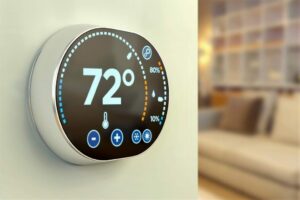When deciding what type of thermostat to get for your home, you generally have three choices. The first is a simple one that you need to manually adjust whenever you want to turn it on and off and to set a specific temperature at any given time. Another is a programmable one that you can arrange for specific but strict schedules to be followed. The last main option is a smart thermostat, which has the main selling point of adjusting to changing circumstances.
Smart thermostats consider several fluctuating factors in determining what temperature to set your home at any given time. A common one is which times of day during which days of the week your home is apt to be empty. Another is the outside temperature at that time.
But will these factors result in a smart thermostat ultimately saving you money? It may sound like a smart thermostat is, well, the wisest choice of those three, and, of course, it will save you money. However, it is not that simple.
First, it is essential to point out something that may seem obvious but is not. Many homeowners who have smart thermostats end up spending more money because they do not use the features provided at all, or they use them in unintended ways due to confusing instructions.
For example, your smart thermostat may depend on the location of residents’ phones to determine who is home when and, more importantly, when the house is empty. If this is not accurately set up, that can unintentionally lead to an increase in energy costs. Also, although motion detectors are generally incorporated, this may not be an effective tool when sleeping or otherwise still.
Another consideration is that if you are working from home like so many are nowadays; it may make more sense for you to adjust it yourself based on your changing comfort levels and personal preferences as far as your thermostat-related energy costs are concerned. Also, if that comfort is more important to you, a smart thermostat may not make sense for you for that reason anyway.
A different situation in which this option may not make the most sense for you occurs if your home is not energy-efficient. In addition, if you live in a mild climate and will not be using it much, any cost savings that you may experience will end up being minimal.
Plus, consider the costs of the smart thermostat itself. Are you sure that it will pay for itself in the end?
With all of this said, taking advantage of what smart thermostats offer may ultimately be in your best interest, both from a comfort standpoint and a monetary one. But make sure to consider these varying factors before you decide to purchase one.